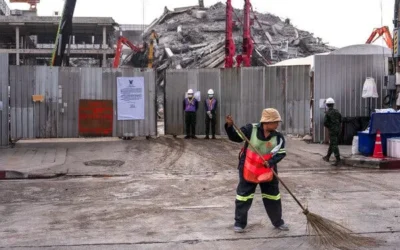Donald Trump’s Push to Deport ‘Home-Grown’ Criminals: A Complex Discussion
In a controversial move, former President Donald Trump has reignited the debate surrounding the deportation of ‘home-grown’ criminals, particularly those who carry out serious offenses within the United States. As Trump positions himself for the 2024 Presidential election, his rhetoric has raised significant questions around citizenship rights and the legal frameworks governing deportation for American citizens. The discussion has grown even more complex in light of a recent Supreme Court decision that halted deportations under wartime law for Venezuelans, highlighting the intricate intersections of crime, immigration policy, and citizenship rights in the U.S.
Understanding ‘Home-Grown’ Criminals and Deportation
Donald Trump’s proposal primarily targets individuals born in the U.S. who have committed crimes — a concept he categorizes as ‘home-grown’ criminality. His assertion that these individuals should face deportation stems from his broader agenda of promoting a ‘law and order’ narrative during his presidential campaign. Advocating for deportation in this context raises vital constitutional and ethical questions about the status of American citizenship.
In the United States, citizenship is a foundational right that often shields individuals from deportation regardless of their criminal record. The Constitution allows for the removal of non-citizens — including undocumented immigrants and lawful permanent residents who commit serious crimes — but does not extend the same legal possibility to American citizens.
Legal Precedent and Citizenship Rights
Historically, the American legal system has established firm protections for citizens, making it virtually impossible for them to be deported based on criminal activity. This protection stems back to the principles laid out in the 14th Amendment, which grants citizenship to all persons born in the U.S. and no provision for deporting them from their homeland. While immigration laws and enforcement focus heavily on non-citizens, attempts to implement deportation policies for citizens after they committed crimes would almost certainly face serious legal challenges.
Legal experts agree that Trump’s proposal contradicts not just constitutional guarantees but raises broader implications for civil rights. Opponents argue that the normalization of such rhetoric could undermine the essence of citizenship, particularly for marginalized communities previously granted protection under the law.
The Supreme Court’s Recent Decision on Deportation
Further complicating the narrative surrounding deportation is a recent ruling from the U.S. Supreme Court, which has upheld a decision halting the deportation of Venezuelans fleeing political turmoil under wartime law. This decision stems from concerns that deportation would pose significant risks to their lives amidst a volatile governmental landscape. The court’s ruling solidifies protections for vulnerable populations while opening up dialogues about how the U.S. treats those seeking asylum or refuge.
These contrasting legal frameworks highlight the discrepancies present within the U.S. immigration system, where nationality and circumstances significantly influence outcomes in deportation cases. While Trump’s argument seeks to enforce the law on domestic criminals, the Supreme Court’s ruling showcases a more compassionate approach to those impacted by external crises.
Public Reaction and Political Ramifications
The public reaction to Trump’s proposal has been mixed, with some supporters praising his stance as a strict enforcement of law, while critics have pointed out the fundamental rights that are at play. This division reflects the larger socio-political landscape in the U.S., where immigration remains a contentious issue, often animated by fear, security concerns, and the fight for civil rights.
Political analysts suggest that Trump’s stance is a strategically calculated move to energize his base ahead of the 2024 election. By framing ‘home-grown’ criminals as a threat, he aims to rally support among voters who prioritize national security and dissatisfaction with crime rates. However, such a move could provoke backlash from communities who feel targeted or stigmatized by his rhetoric.
The Broader Implications for Immigrant Communities
For immigrant communities, this discussion elicits a deep concern about the future of immigration policy in the U.S. Many advocates argue that it reinforces an atmosphere of fear and stigma that can further marginalize individuals already living in the shadows. Additionally, the language employed in Trump’s rhetoric may impact public perceptions, leading to increased discrimination against immigrants, whether documented or undocumented.
Immigration advocacy groups have decried the initiative, emphasizing the need for reform that focuses on healing and inclusive practices rather than punitive measures against communities disproportionately affected by crime and social neglect. Their message asserts that solutions should prioritize rehabilitation over alienation for both citizens and non-citizens.
The Challenge of Balancing Crime and Civil Rights
As the U.S. grapples with rising crime rates in certain urban centers against the backdrop of immigration issues, leaders on all sides must contend with the challenge of balancing public safety and civil rights. Lawmakers in Congress face the daunting task of crafting policies that ensure effective law enforcement while respecting the rights of all individuals — particularly those who belong to marginalized communities.
While Trump’s proposed measures may resonate with his supporters, they risk deepening divisions within the country. Effective communication and collaboration that include perspectives from affected communities may create pathways toward solutions that foster both safety and justice.
Conclusion: The Future of Deportation Policy
In conclusion, Donald Trump’s vigorous push to classify ‘home-grown’ criminals for deportation underlines a critical point of contention in American law, citizenship rights, and immigration policy. The recent Supreme Court ruling on Venezuelans serves as a reminder of the complexities that surround deportation and how they intersect with individual rights. As the debate continues to unfold, it is imperative that policymakers and citizens alike engage in constructive dialogues that weigh the demands of law enforcement against the foundational principles of justice, fairness, and humanity. The implications of these discussions will undoubtedly shape the legal landscape affecting both citizens and immigrants well into the future.







